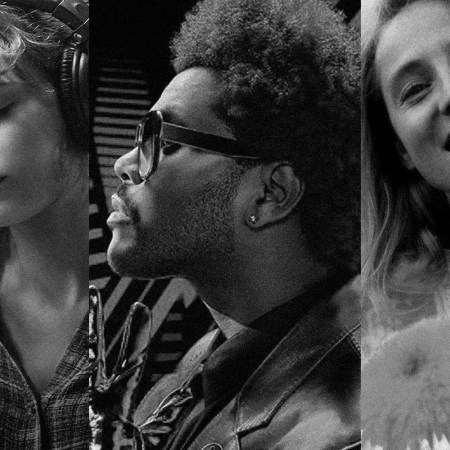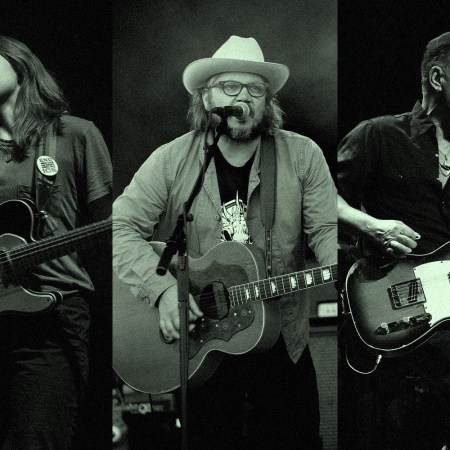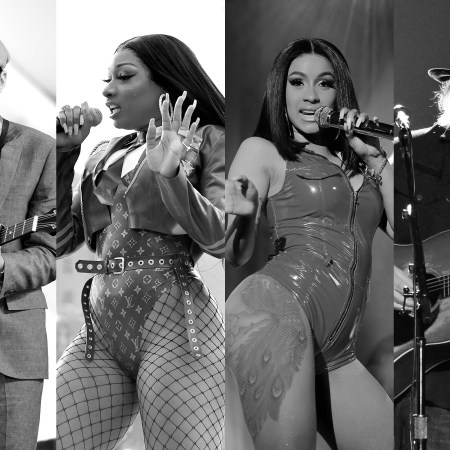This is Hear Us Out, a column charting the storylines and releases that mattered — to us, and hopefully you — in the world of music over the past month.
It’s easy to get a little gloomy once we hit September. The end of summer can be a bummer under normal circumstances, but during a pandemic with no end in sight, it’s downright foreboding, a reminder that cold weather will soon force us all back indoors while flu season looms and we brace ourselves for another potential spike in COVID-19 cases as schools reopen and more people return to work.
Of course, musicians haven’t been able to return to work, and it seems as though a handful of them have gotten restless this past month, tweeting out dangerous conspiracy theories or anti-mask views and calling for a return to full-capacity concerts. Meanwhile, more reasonable people have begun to realize that the virus could pose a threat to 2021 tours and festivals as well — meaning a much longer hiatus from live music as we know it than we originally anticipated back in March. With that in mind, these are the biggest storylines and most notable releases from the past month.
Is Kanye Right About Recording Contracts?
Kanye West has struggled very publicly with his mental health in recent months, and this month, he focused his attention on his contract with Universal, tweeting out roughly 100 pages of legal documents and likening it to “modern day slavery.” His attempts to prove his point (which included doxxing a Forbes journalist and tweeting out a video that appeared to show him peeing on a Grammy Award in a toilet) seem to indicate that he’s still in the throes of some sort of mental health crisis, but despite the way he said it … does he have a point about record labels’ predatory contracts and the way they exploit artists?
West sat down with Billboard this month and outlined his plans to overhaul the music industry, revealing that he wants every artist to own their masters and their own copyrights, saying, “You have to adapt. You can’t have old rules for new games. No other business in the world would suggest you don’t adapt to a completely new supply chain and income sources … Currently, artists take advances to make records and yet when they repay those advances the record company still owns the records. Imagine a bank lending you money to buy a house and then when you’ve repaid that mortgage, them telling you they still own it.”
“I think he wants Universal to treat him the way Adidas and The Gap are treating him and he wants to help Universal,” longtime label executive Steve Rifkind told Variety. “Not only for himself but to help the other big record companies, from a creative standpoint. I feel the record companies have to get creative again and develop artists again and that’s why the artists aren’t respecting the labels any more. Name one artist who’s truly happy.”
It’s certainly true that many artists are exploited by their record labels, and the industry is certainly overdue for change, but as Vice points out, West’s deal with Universal is actually much better than most. “There’s an element of truth to many of Kanye’s tweets about the recording industry,” the publication noted. “Hidden fees and shoddy royalty rates can make it difficult for a musician to make a living, and some artists do get trapped in exploitative contracts. But Kanye isn’t one of them.”
Anti-Mask Artists Make Their Dangerous Opinions Known
Most artists seem to understand the severity of COVID-19, and while they’ve been dealt a crushing financial blow as live performances remain out of the question for the time being, they understand that their safety and the safety of their fans, crew and anyone else they may encounter has to come first.
However, there have been a few who have behaved irresponsibly by holding concerts that ignore social distancing guidelines. This month also saw a more disturbing trend as several prominent musicians started spewing their anti-mask beliefs and, in some instances, even penning protest songs about the disease.
In a recent podcast interview, former Oasis guitarist Noel Gallagher voiced his dangerous opinion about masks, saying, ““It’s not a law. There’s too many fucking liberties being taken away from us now … I choose not to wear one. If I get the virus it’s on me, it’s not on anyone else … it’s a piss-take. There’s no need for it … They’re pointless.” (Spoiler alert: they are not.) Stone Roses’ Ian Brown took it a step further, tweeting out a bunch of conspiracy theories about COVID-19 and referring to it as a “fraud” that was “planned designed to make us digital slaves.” If that wasn’t bad enough, he released a new anti-lockdown song called “Little Seed Big Tree.”
Van Morrison has also been outspoken about the virus, calling socially distant concerts “pseudo-science” and calling on other musicians to join him in fighting for the immediate return of full-capacity shows. (Of course, full-capacity shows will be permanently out of the question if everyone catches the virus and dies from ignoring social distancing guidelines.) He also put out an anti-quarantine song of his own, “Born Free.”
Artists are certainly free to express themselves in song however they wish, but it’s alarming to see some use their platform to spread misinformation or encourage others to engage in dangerous behavior. Facts are facts, and refusing to social-distance properly or wear a mask is only going to keep live music away longer.
Is a Digital SXSW a Sign of What’s to Come in 2021?
When Austin’s SXSW made the last-minute decision to cancel their festival for the first time in its history back in March, it was one of the first dominoes to fall for a music industry that would go on to be absolutely devastated by the coronavirus pandemic. There was no way of knowing back then just how long quarantine would stretch on, and festival organizers were hopeful they’d be back at it in 2021.
Of course, we know now that the idea of hosting some 200,000 people at an event featuring a week of live music this coming spring is not only overly optimistic, it’s … not even a possibility, and last week SXSW finally bit the bullet and announced that their 2021 edition will be going digital.
“The challenge of building a new future is one that we’re excited to tackle,” said SXSW CEO and co-founder Roland Swenson in a statement. “This has been such a year of change and we, like the entire world, are reshaping our perspective on how we connect. We’re pleased to be working on SXSW Online as part of our program for 2021, and regardless of platform, we will continue to bring together the brightest minds from creative industries worldwide.”
It’s a smart, safe decision, but as we inch closer to 2021, it also begs the question: will other major music festivals that had previously promised to make their returns next year realistically be able to do so, or will SXSW be the first of many to shift online? If a music festival in March is totally out of the question, what about Coachella in April? Even something like Bonnaroo in June feels optimistic at this point. As will everything else until a vaccine is readily and widely available.
Recommended Reads
This month at InsideHook, we put together a fall playlist for you, examined the futility of Rolling Stone‘s “500 Greatest Albums of All Time” list, chatted with Tim Heidecker about his surprisingly timely album Fear of Death, and talked to a bunch of music journalists about how they were inspired by Almost Famous to pursue careers in the field. (As always, you can find all our music coverage here.)
But we’re not the only ones whose work is worth a read, and September saw plenty of articles from other sources worth your attention, including Rolling Stone‘s updated list of the 500 Greatest Albums of All Time, Mel‘s investigation into “Why Grown-Ass Men Get So Emotional About Carly Rae Jepsen,” and Pitchfork’s look at “What It’s Like to Be Black in Indie Music.”
Key Album Releases
Fleet Foxes, Shore
Fleet Foxes surprised us this month with the announcement that they’d be releasing their follow-up to 2017’s Crack-Up at exactly 9:31 a.m. EST on Sept 22 — the precise moment the autumn equinox began and summer officially gave way to fall. It is, naturally, a perfect fall listen (you can read more about why here), and it features some strong contributions from Grizzly Bear’s Daniel Rossen and Chris Bear, Kevin Morby, Hamilton Leithauser, Uwade Akhere and more.
IDLES, Ultra Mono
A lot of the attention during this press cycle for these Bristol punks has centered around their feuds with other bands like Sleaford Mods and Fat White Family, who recently accused the band of “virtue signaling” for speaking out on behalf of the working class while coming from a middle-class background. But when you strip away all of that and just listen to Ultra Mono, you’re left with an intense call to arms from IDLES as the band dials up the urgency in addressing the ills of society.
Bill Callahan, Gold Record
Bill Callahan’s follow-up to last year’s Shepherd In A Sheepskin Vest is the singer-songwriter at his best, firing on all cylinders and painting rich, often-funny portraits of domestic life on tracks like “Breakfast,” getting introspective on “35” (““I can’t see myself in the books I read these days/ Used to be I saw myself on every single page”) and downright goofy on “Ry Cooder” (“English rockers, all their money goes straight up their nose/ But Ry just smiles and tries a difficult yoga pose”).
Songs You Need to Hear
Sufjan returns; Matt Berninger gives us another taste of his forthcoming solo album; Kurt Vile duets with the late John Prine; Kevin Morby releases an ode to Kansas twilight with “Don’t Underestimate Midwest American Sun”; Public Enemy is joined by Ad-Rock, Mike D and Run DMC for an all-star throwback track; Orville Peck and Paul Cauther team up as The Unrighteous Brothers to cover a beloved classic; Bruce Springsteen and Jeff Tweedy both released singles from their highly anticipated upcoming October albums; Shamir goes country. You can listen to all those and more in the playlist below.
This article was featured in the InsideHook newsletter. Sign up now.






















